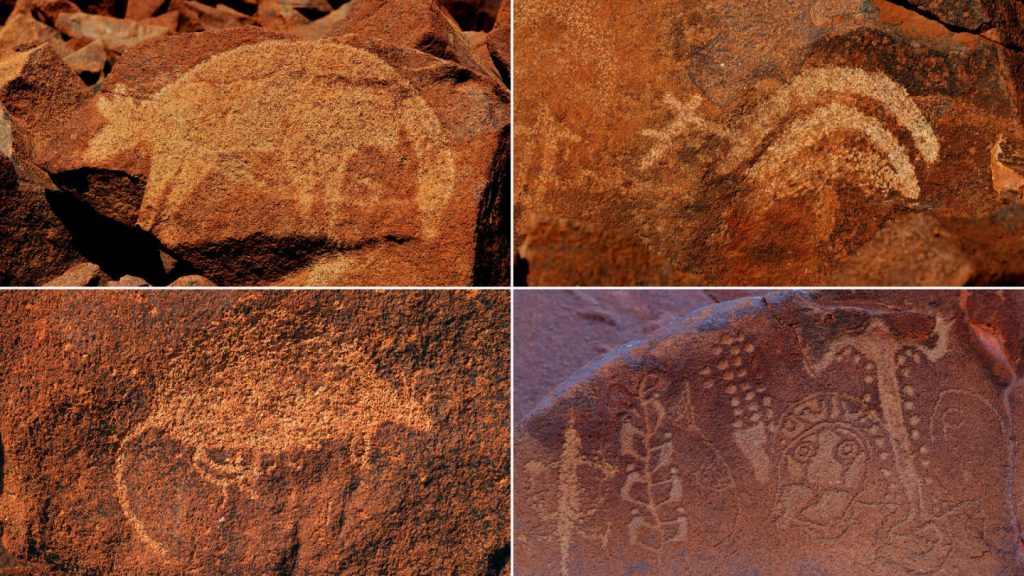Race and power collide in a fight over sacred rock art in remote Australia

One is home to the small but booming city of Karratha, a regional hub scattered with four-wheel drives that was purpose-built in the 1960s to accommodate a growing army of miners looking to extract the land’s vast stores of iron ore, oil and gas. The other is Roebourne, a former gold rush town 30 minutes up the highway, where the peninsula’s Indigenous population settled after being driven from their lands by colonialists in the mid-1800s. For years, news reports painted Roebourne as a “misfit town where everyone drinks, smokes and can’t take care of their kids,” says Josie Alec, a proud descendent of the Kuruma-Marthudunera people, who raised her four kids there. In reality, she says it’s a deeply resilient community made up of families like her own, whose ancestors have watched over “Murujuga” — the peninsula’s Aboriginal name — for generations, while keeping its vibrant cultural traditions alive.The two women started visiting the countryside around Murujuga as children in the 1970s and 80s — around the same time Woodside arrived on the peninsula to begin construction on its sprawling Karratha gas complex. For Cooper, that meant floating down the Fortescue River on hot days, while watching the local mothers wash their clothes and prepare food. “I’d swim in the river, have a feed out bush (eat outdoors). We knew industry was there, but we didn’t see it … back then even the iron ore mines were out of sight,” she said.Like a lot of young First Nations people living across the Pilbara, Cooper eventually found herself working in the mines. For three years, she operated heavy machinery for Rio Tinto, but quit after questioning the damage it was doing to country. “I realized my job was to protect Murujuga, not dig it up. The economy here shouldn’t just be about breaking up the earth and sucking everything out of it.” In 2016, Cooper was elected as one of MAC’s board members, a role she proudly occupied for more than five years until February, when she resigned over the corporation’s support of Woodside’s Scarborough development. “I felt the elders were being manipulated and had no understanding of the risks the project posed. It broke my heart to leave, but I couldn’t support MAC approving the removal of our history,” she told CNN.
Ancestral guardians fear that industrial emissions from the gas processing plants could erode Murujuga’s petroglyphs. (Greg Wood/AFP/Getty Images)
Raelene Cooper resigned from MAC in February over the corporation’s support of Woodside’s Scarborough development. (Woop Woop Pictures)
For Alec, protecting Murujuga is part of a journey to heal the bonds severed with her ancestors when she was forcibly removed from her mother as a baby and placed in foster care under a government policy from 1910 to the 1970s to “assimilate” First Nations children. The policy created what’s known as the Stolen Generation, who carry the trauma of separation from their people. At the time, the government claimed it was for their own good. “Growing up as an Aboriginal girl in a White world was tough, but I had a really good foster mom and dad and a strong family,” Alec told CNN.Alec’s adoptive parents eventually brought her back to Murujuga to meet her birth mother and learn about her ancestors. By the time she was a teenager, she was making regular trips to Roebourne and its surrounding countryside, and it was there she began discovering the traditional healing techniques her family was known for — by learning to read Murujuga’s rocks. “My mom was the shaman of the tribe, everyone came to her for healing, and eventually she passed that down to me.””My family story lies in those rocks … They take me home, so that’s why I fight so hard for them,” she told CNN. A tale of contrasting fortunes The contrast between extreme wealth and poverty that’s come to define the Pilbara is clear in the recent histories of Roebourne and Karratha. While Karratha transformed from a small resource town to a regional city, Roebourne battled poverty, alcoholism and racial violence. In the 1980s, the town was thrust into the national spotlight after a First Nations teenager died in a police cell, provoking fury and an inquiry into Aboriginal deaths in custody. Today, the fight for Murujuga’s rock art reflects long-standing and unresolved issues of race and power. The United Nations Declaration on the Rights of Indigenous Peoples states that consent from First Nations people for projects on their land should be provided freely, without coercion or manipulation, and that the self-determination and sustainability of their communities should be at the core of all negotiations. But in Australia, that’s rarely been the case. Until the early 1990s, experts say little thought was given to Indigenous land rights due to the concept of “terra nullius,” which held that the continent belonged to no one before White settlement. In 1992, Native Title law was written to recognize Indigenous land rights, but it was only designed to secure First Nations people a share of the profits from exploration or mining activities on their lands, not to stop developments altogether. Smith also expressed concern about the transparency of the rock art monitoring program due to the absence of independent oversight and a lack of access to its raw data.”At the moment, we don’t have access to any of the data that has been produced. It has ‘confidentiality’ written all over it. It shouldn’t,” he said. “I cannot see any reason for secrecy of any form of something that is of such public interest.”A spokesperson for the state Department of Water and Environmental Regulation (DWER) said the raw data will be peer-reviewed by a panel of scientists selected by the government in mid-2023 after the first full year of monitoring. The raw data will not be published, the spokesperson confirmed.In a country that’s built its fortunes on mining and stands to make billions of dollars in gas exports in coming decades, few political avenues exist to stop Woodside’s expansion.There’s no statutory timeframe for the independent assessor’s report into development on Murujuga, and in the meantime Perdaman and Woodside are pushing ahead with their projects.Alec and Cooper have welcomed the extra scrutiny, but they say the government’s refusal to grant an earlier request to halt the Perdaman plant “reveals the hypocrisy at the heart of all consultation between traditional custodians and industry.”Perdaman declined CNN’s requests for comment.Alec and Cooper say they won’t back down until they’re convinced Murujuga will be protected.”The rocks are ancient beings,” Alec said. “My job as a custodian is to share our stories and spread awareness in a way that makes people feel and understand the power of this place.” “It’s a very personal fight,” Cooper added. “But it’s a fight for all of our people and for Australia.”







